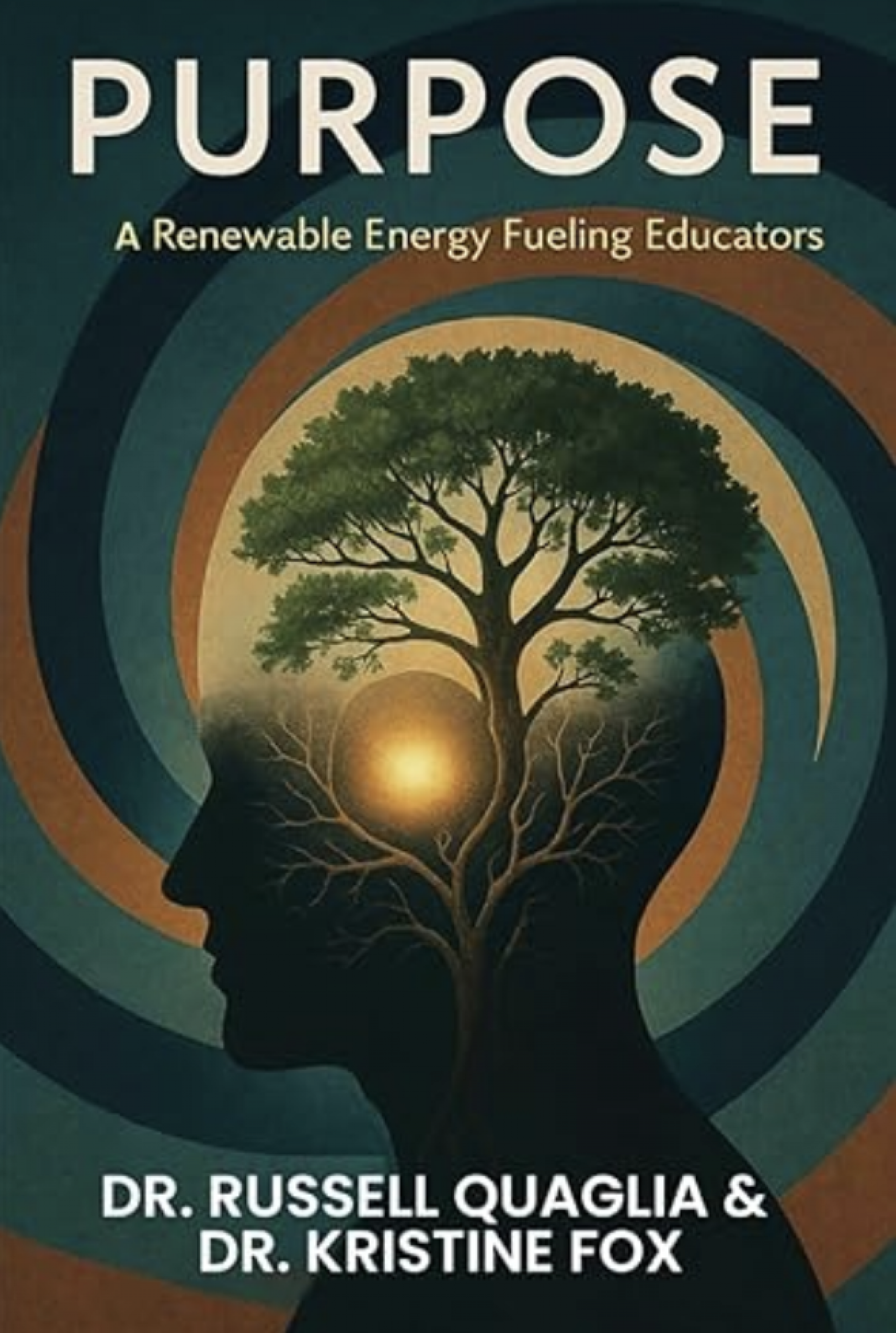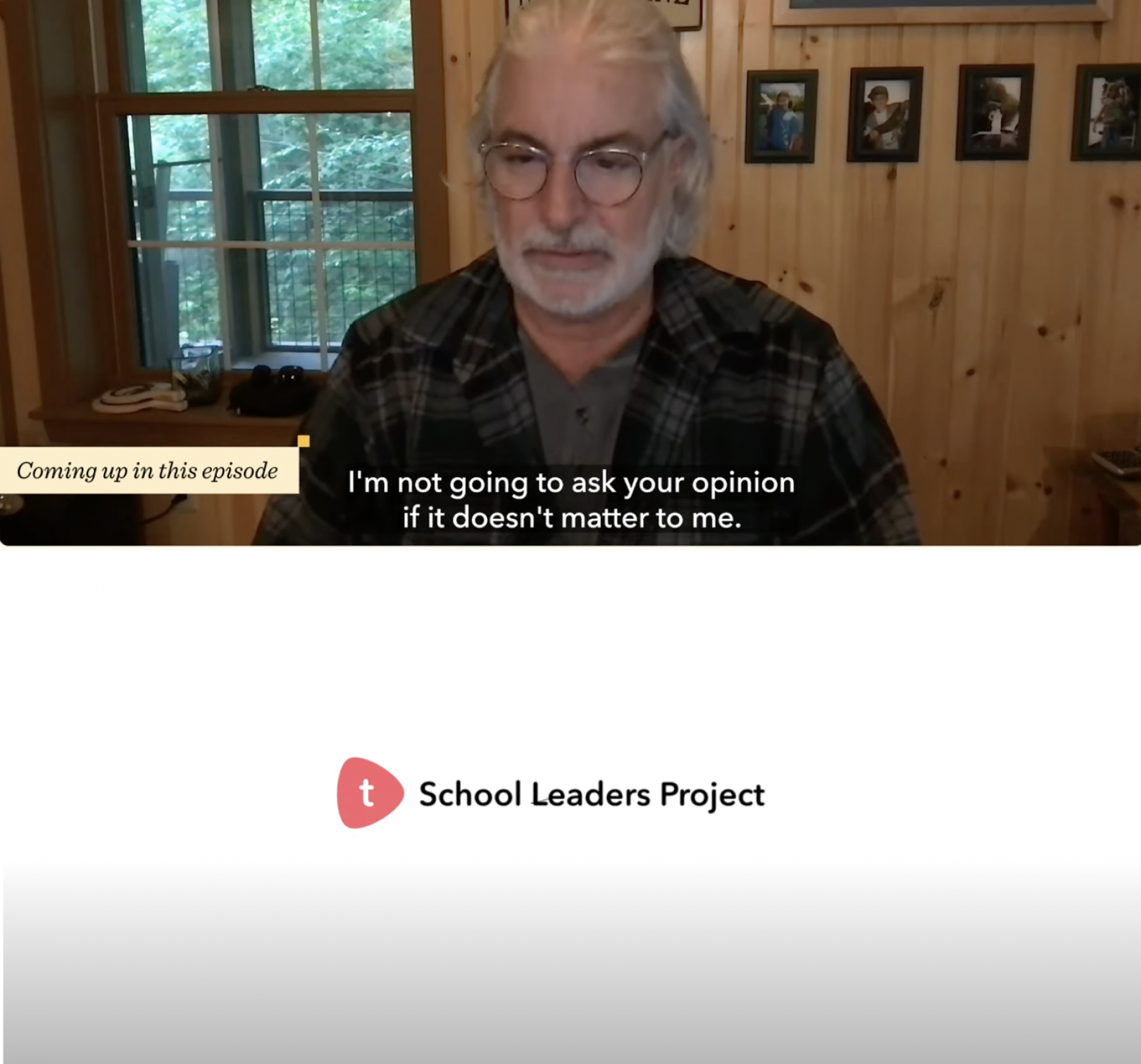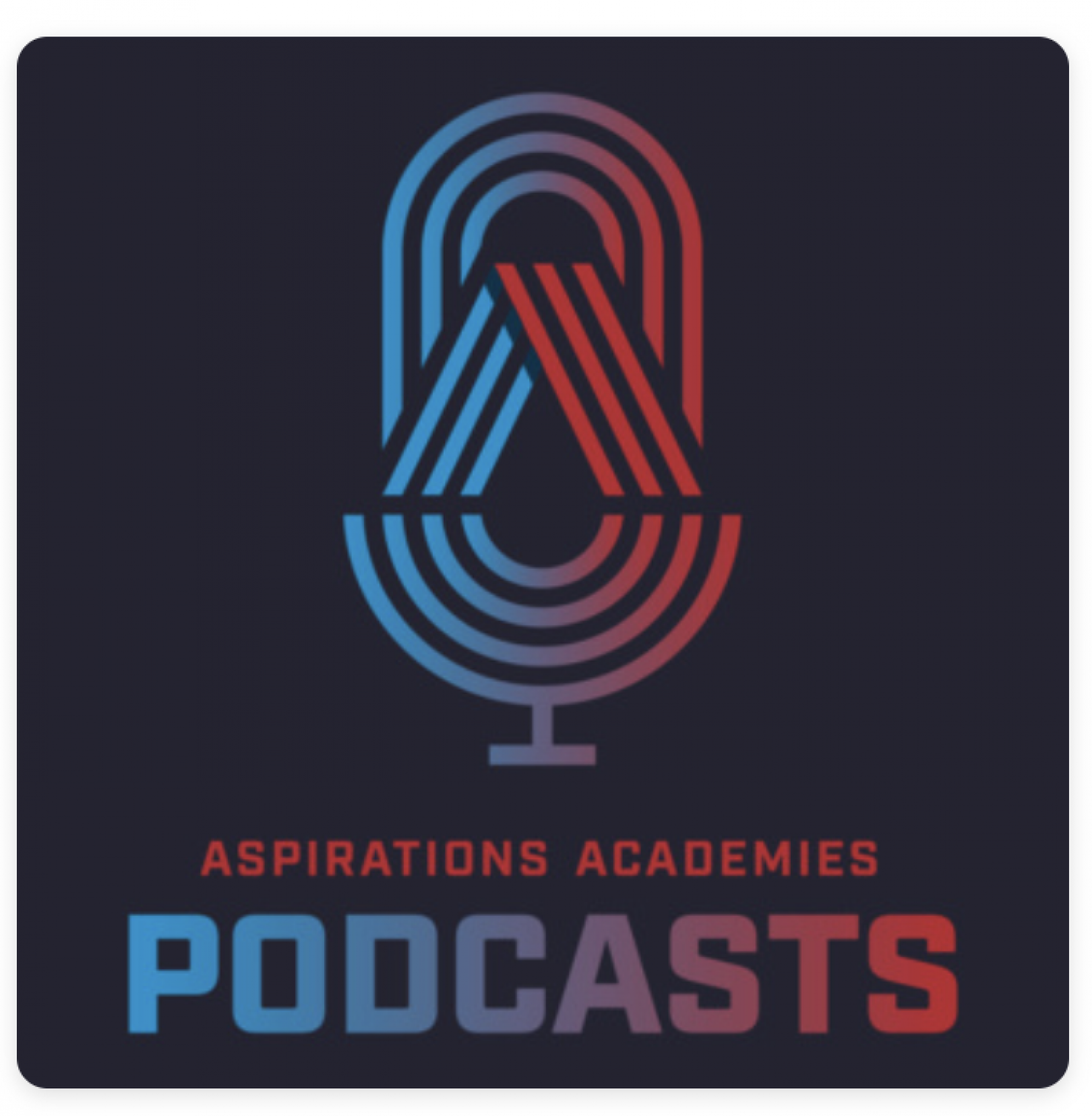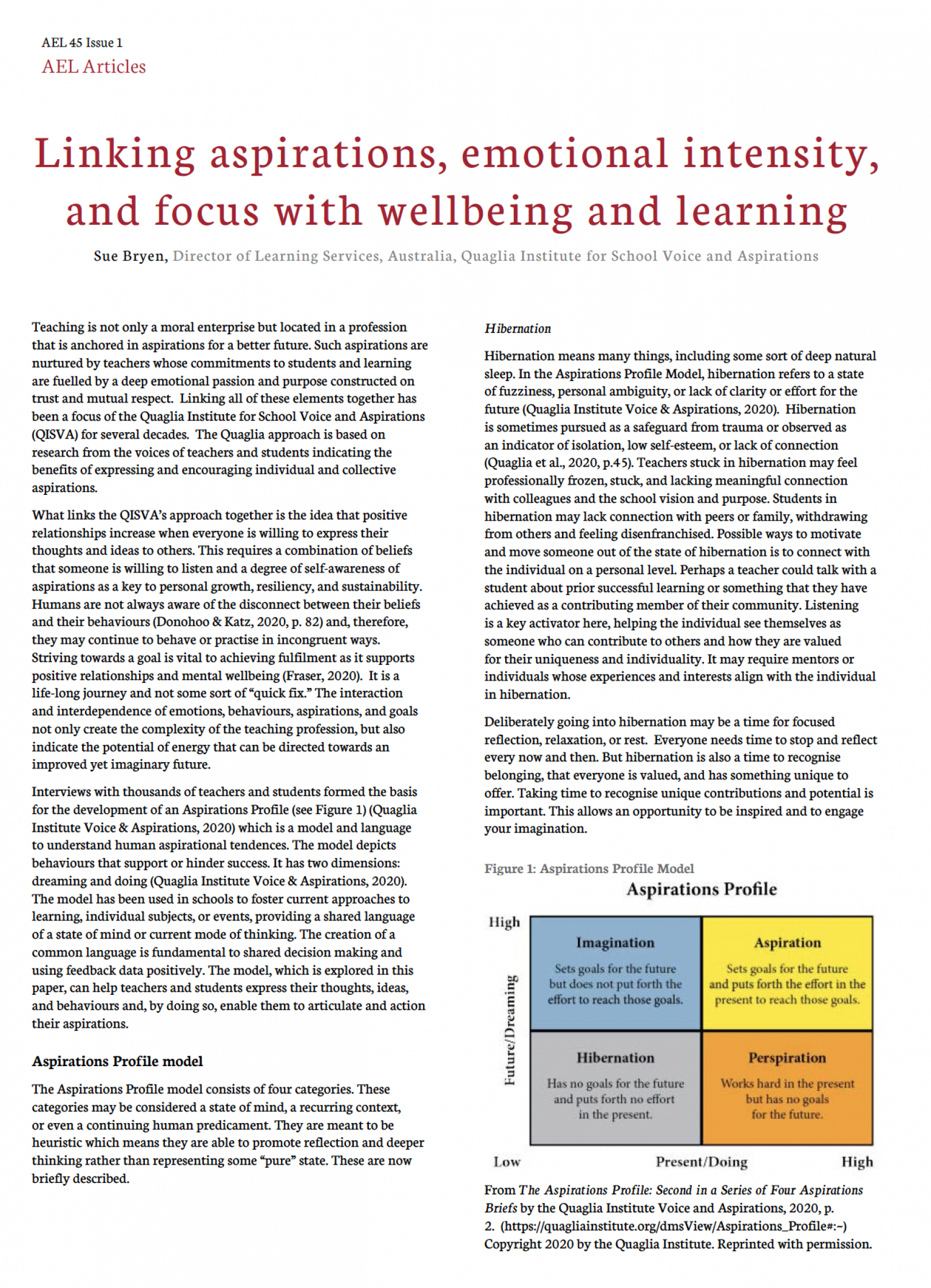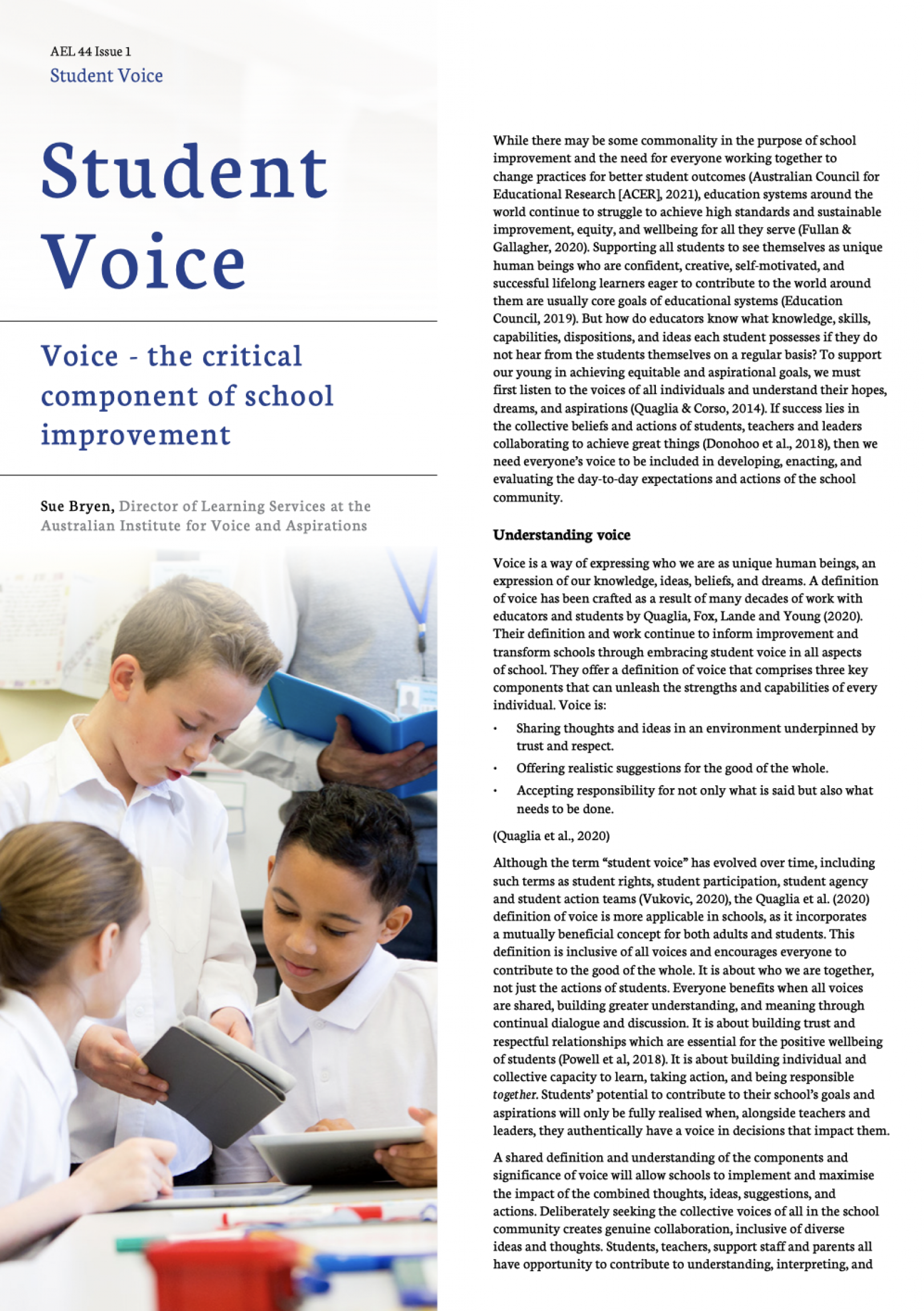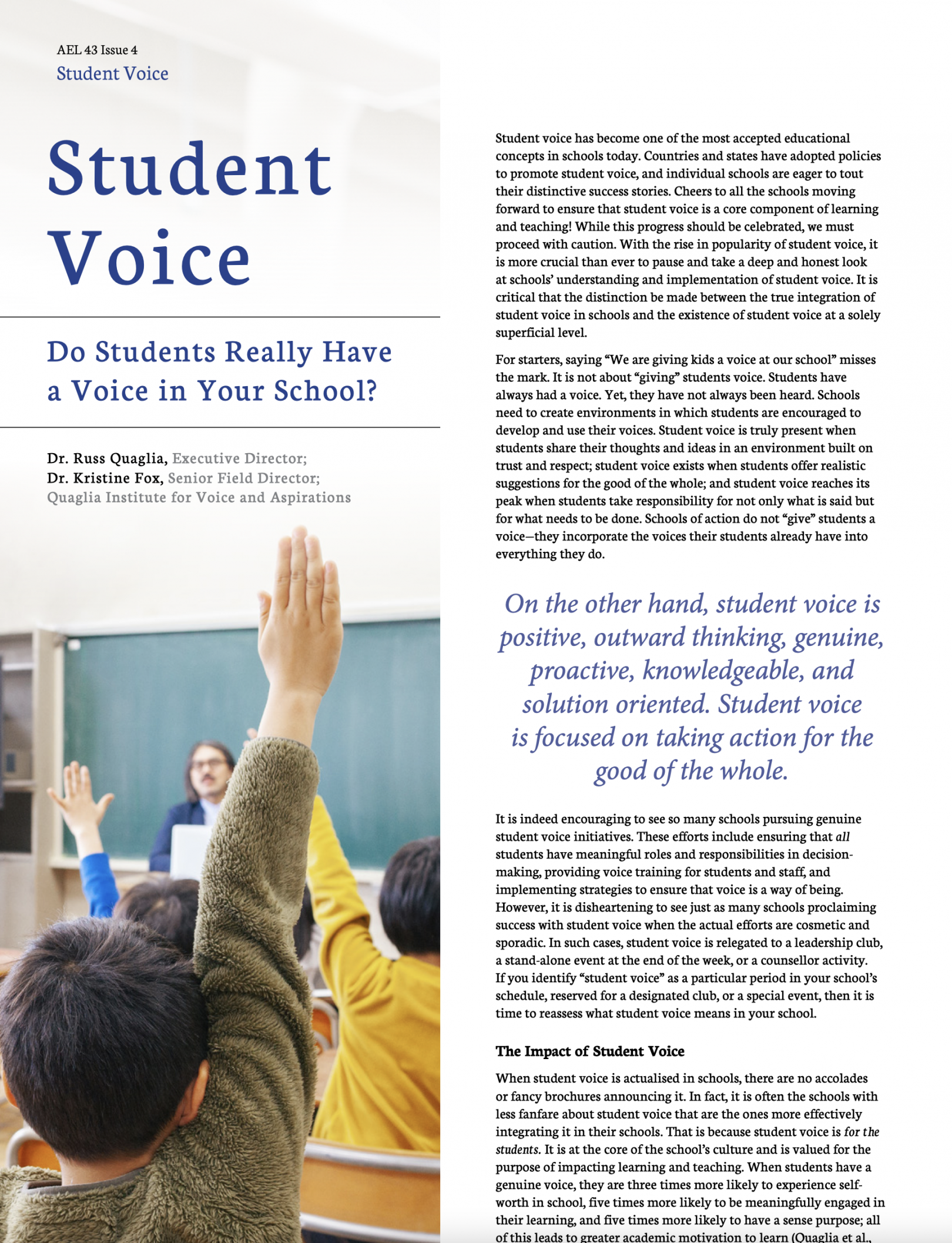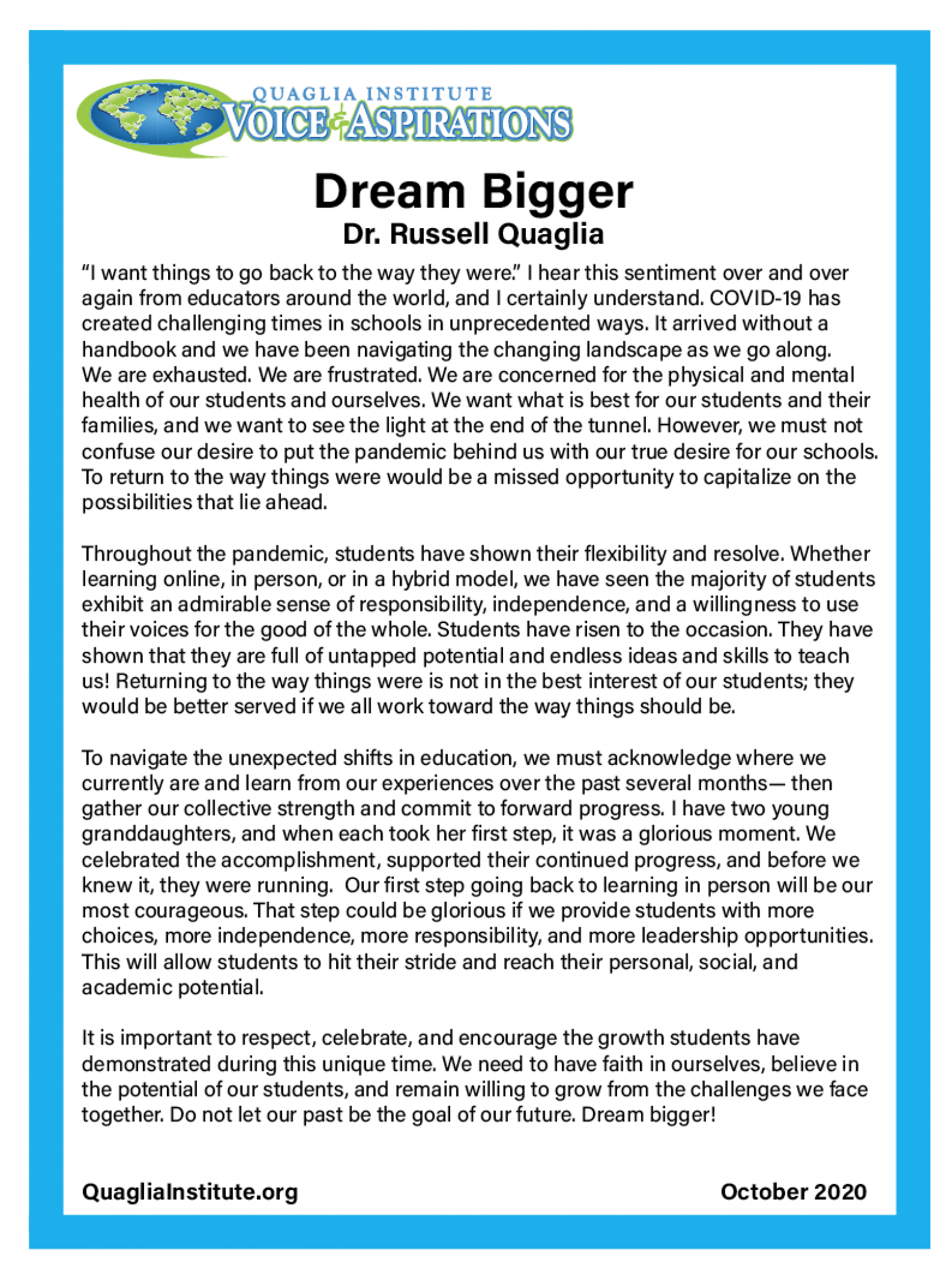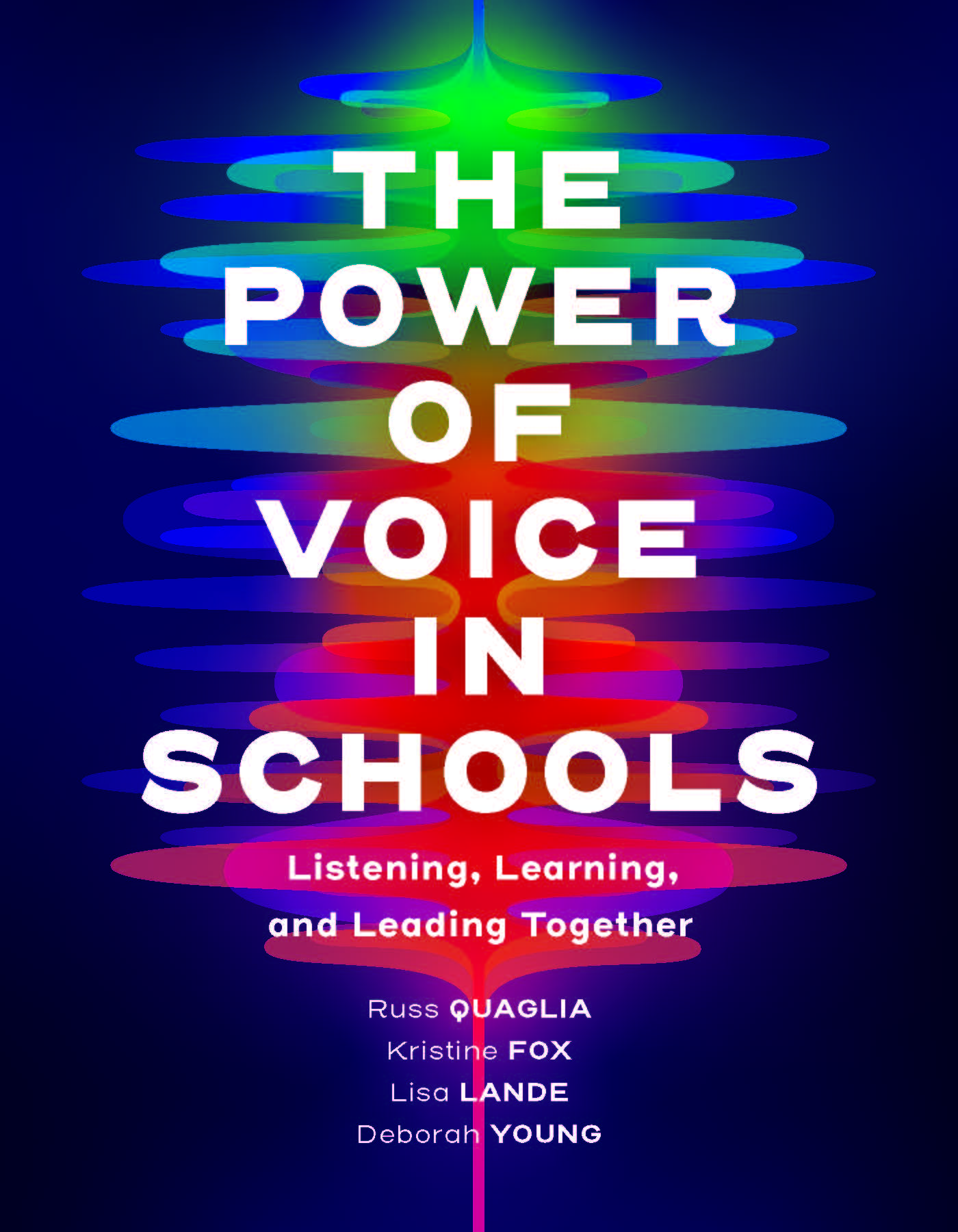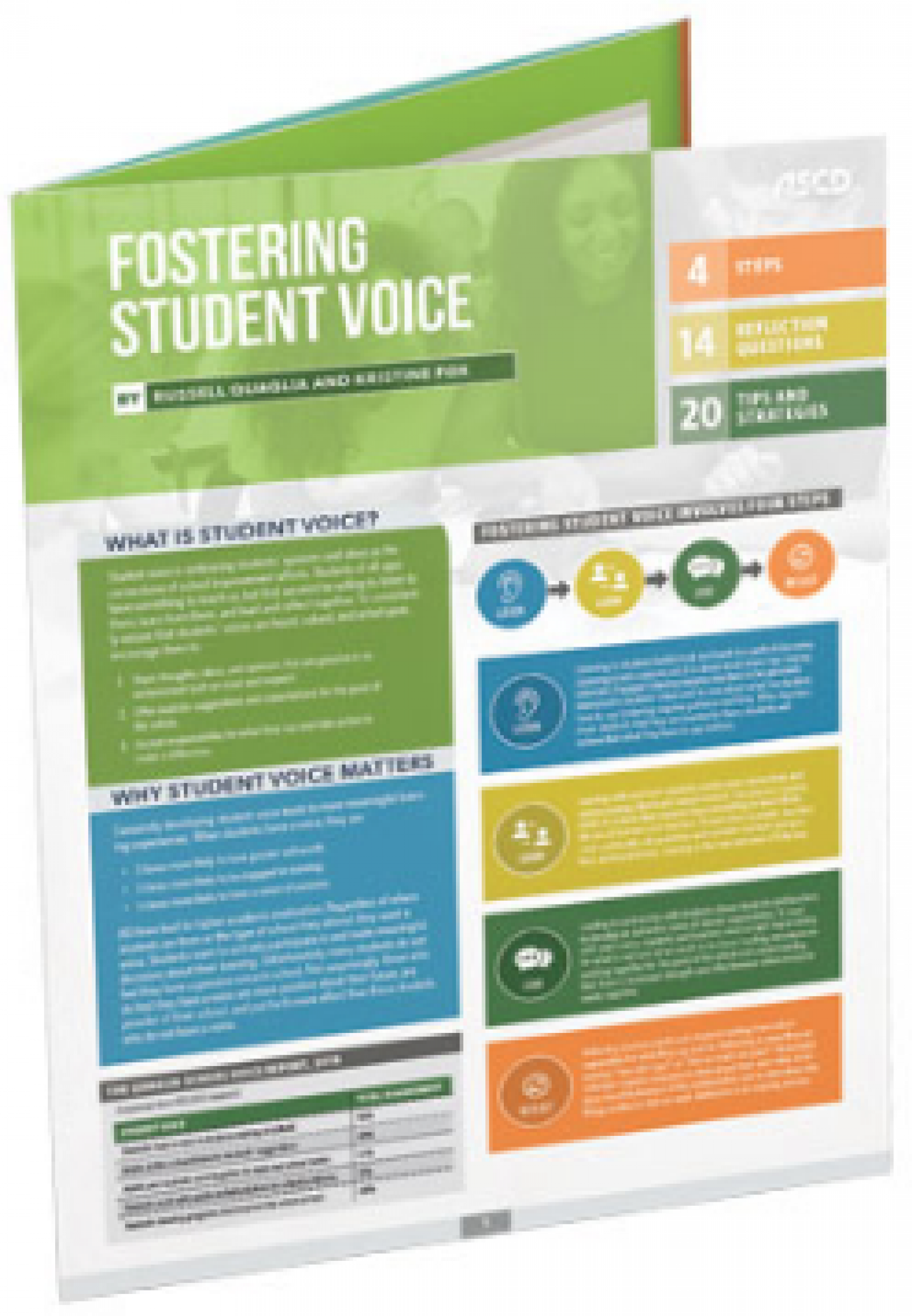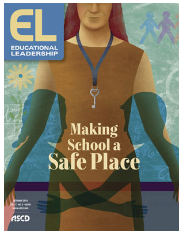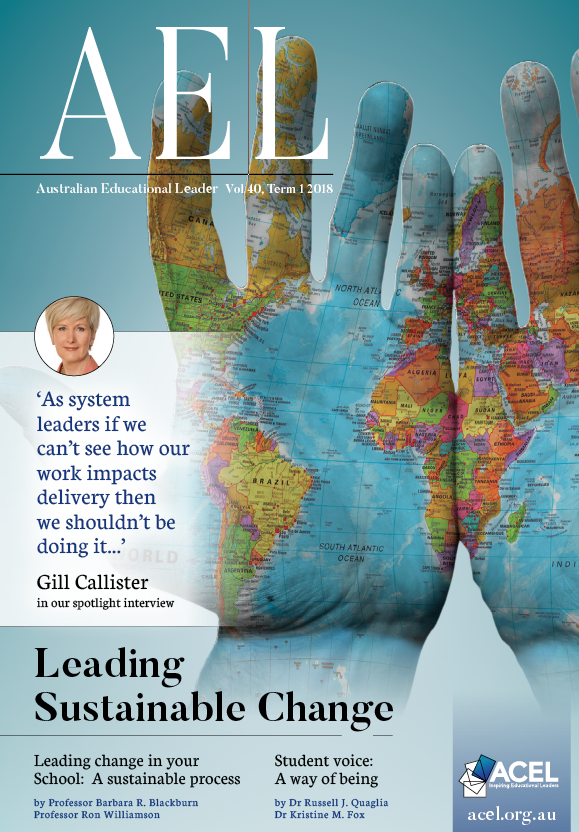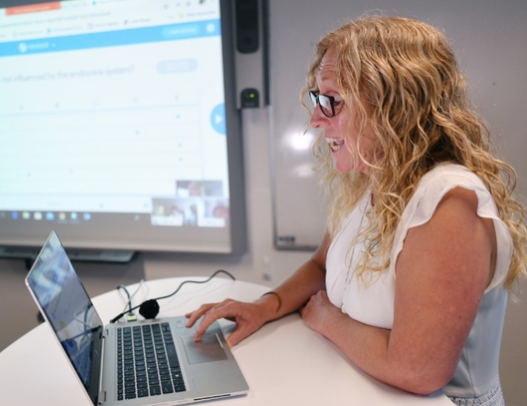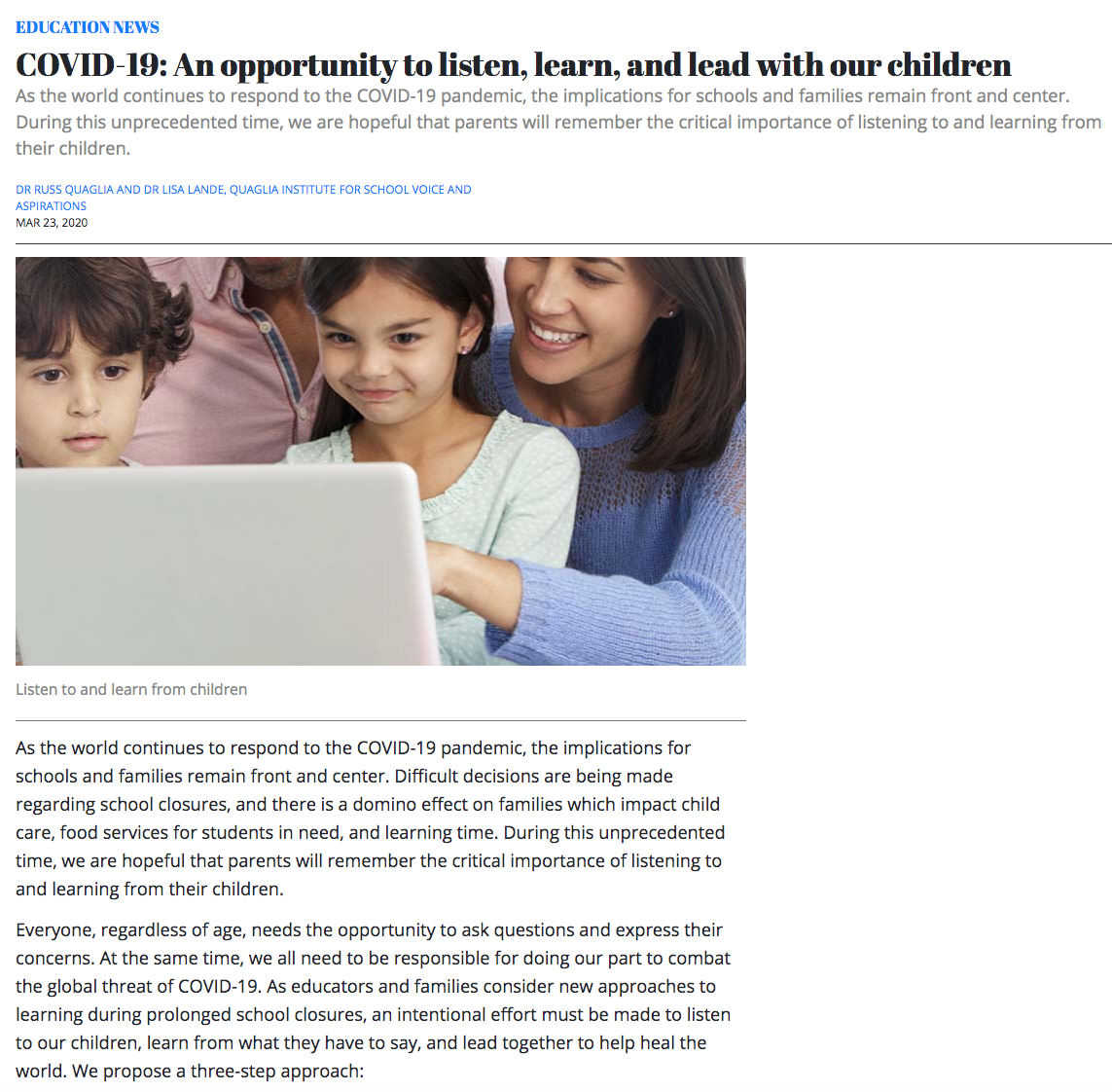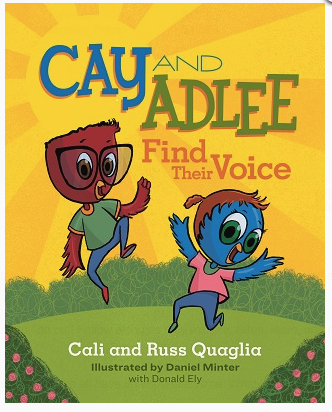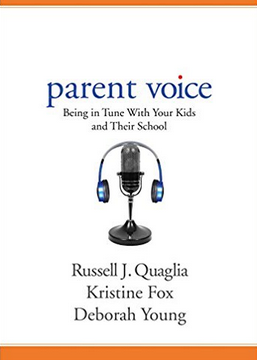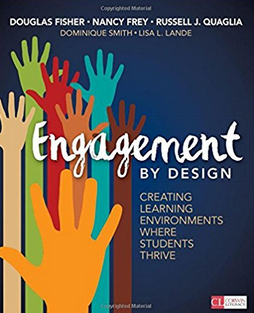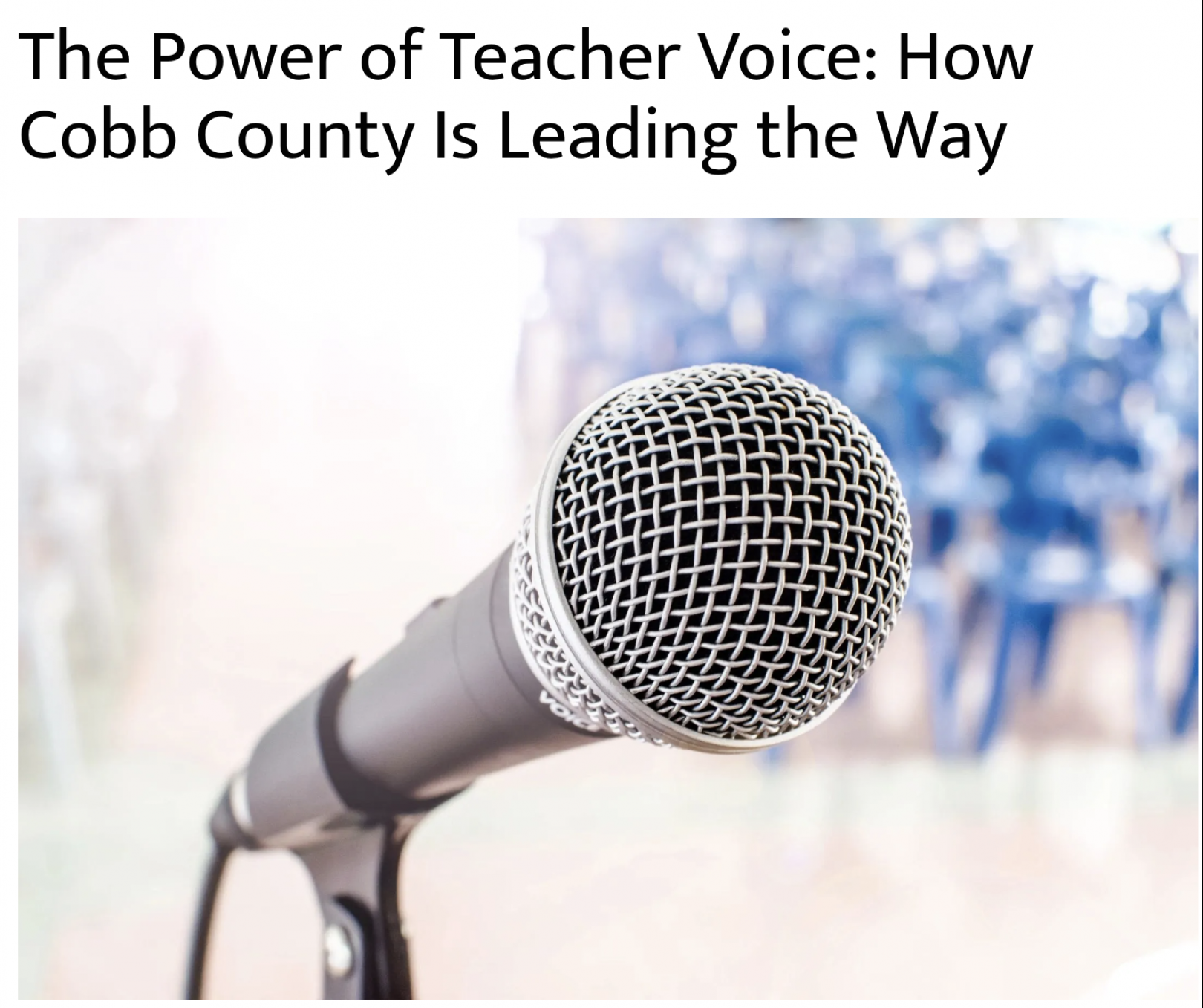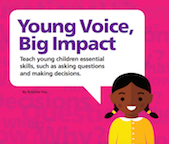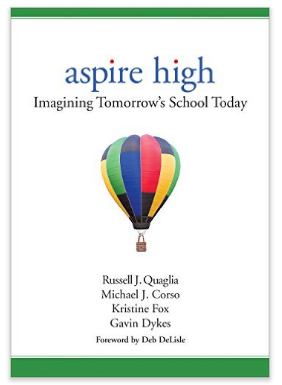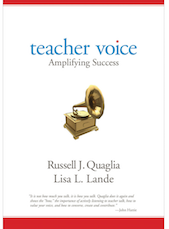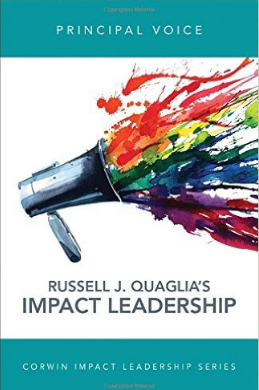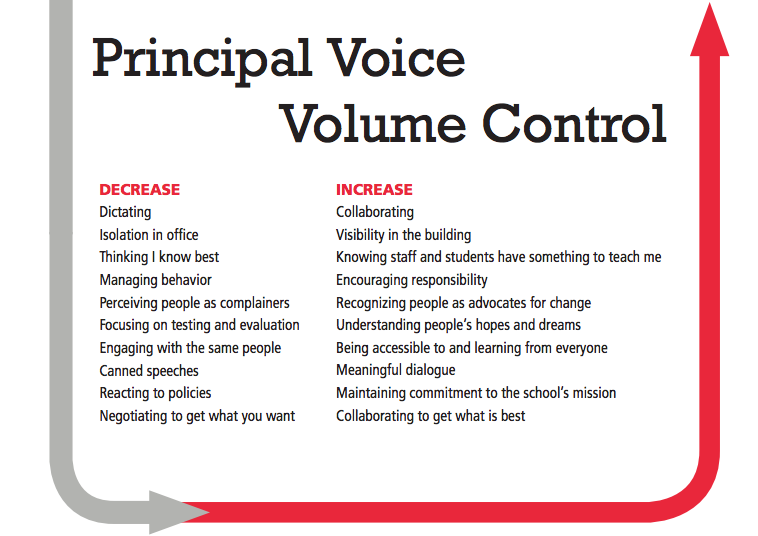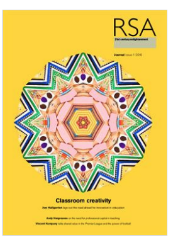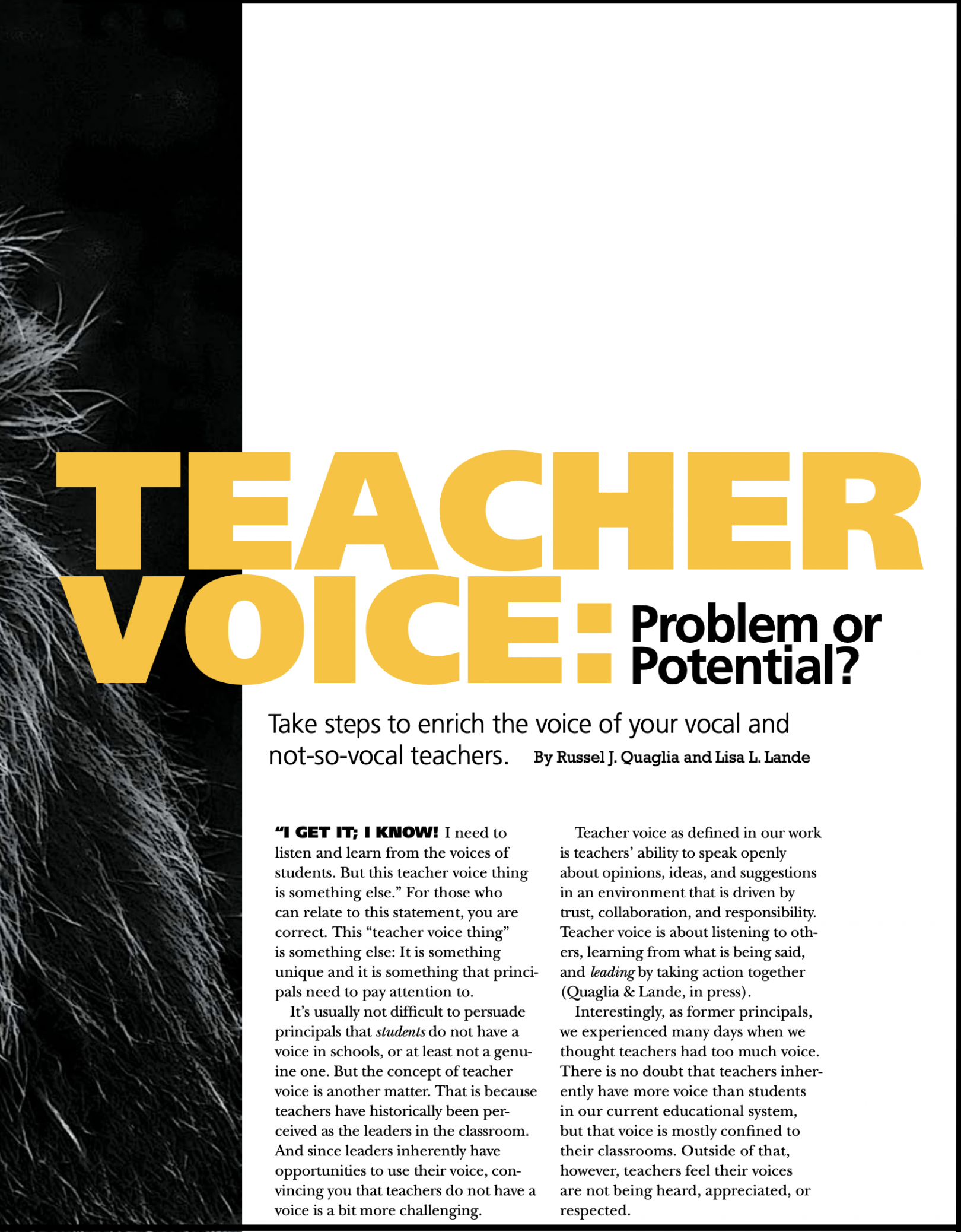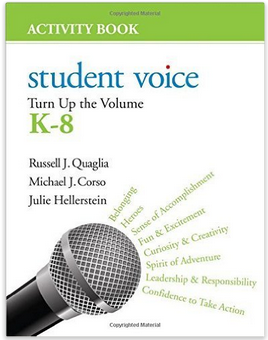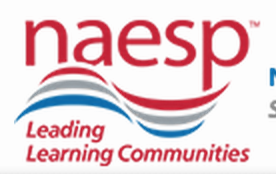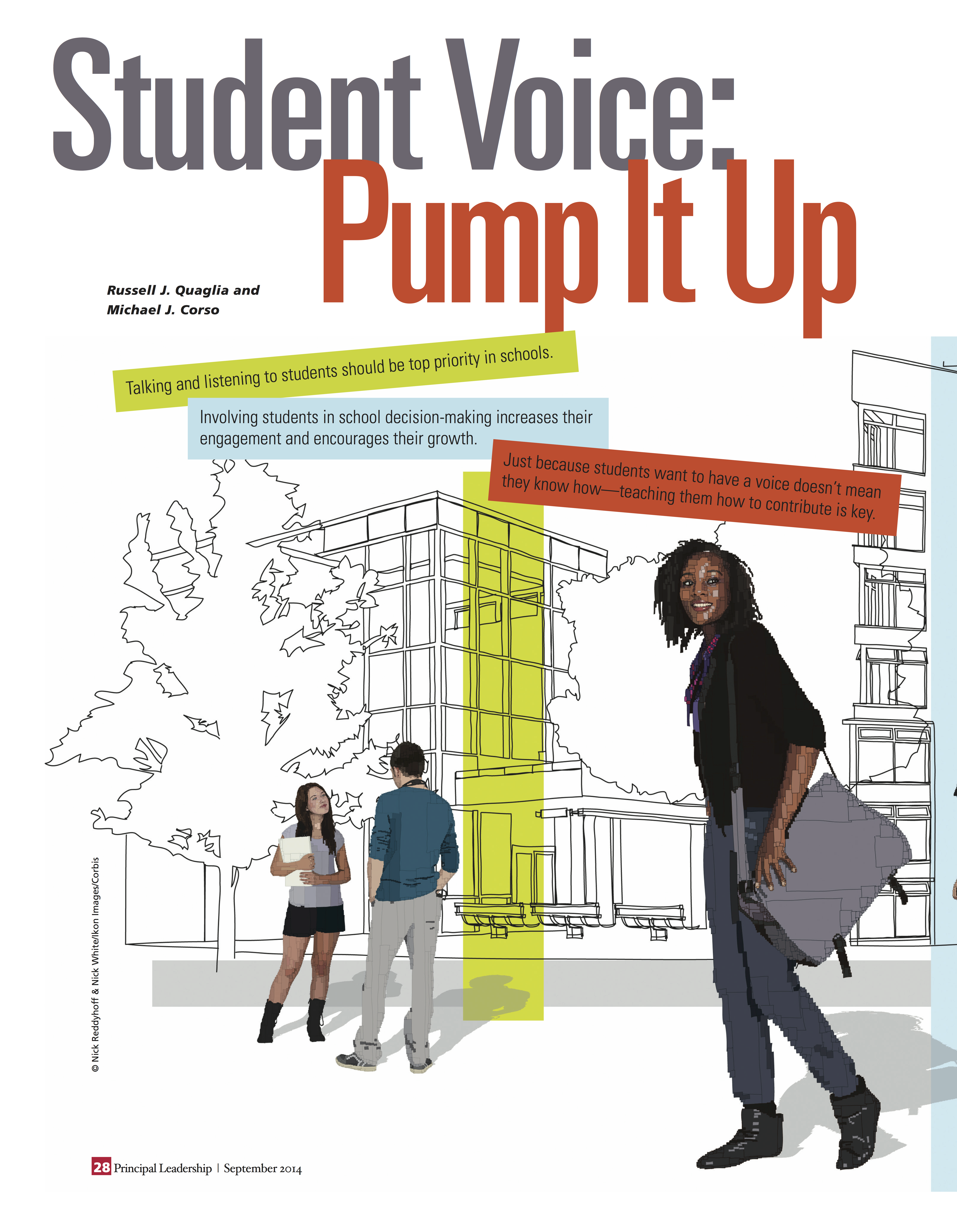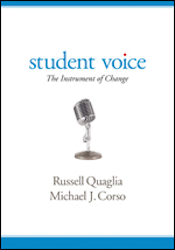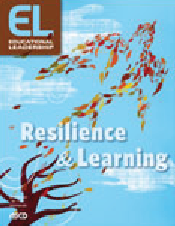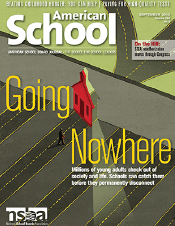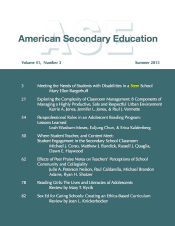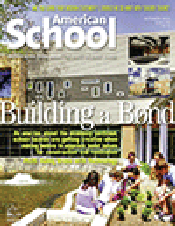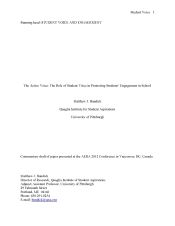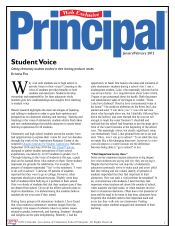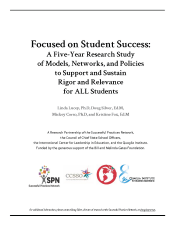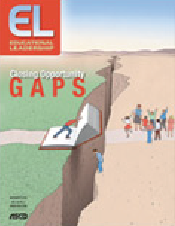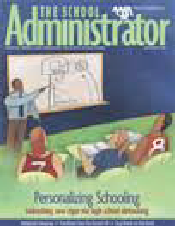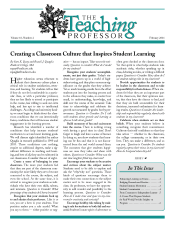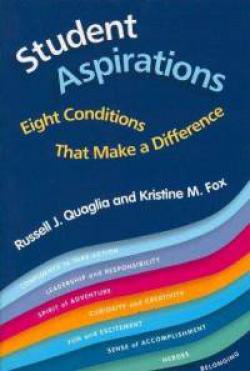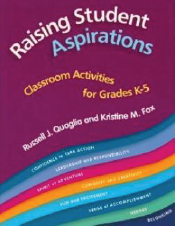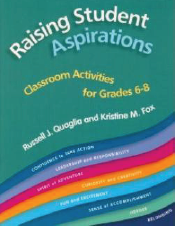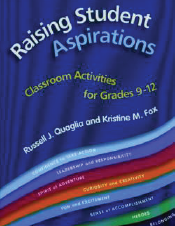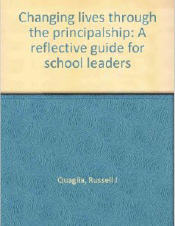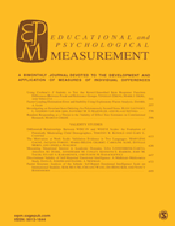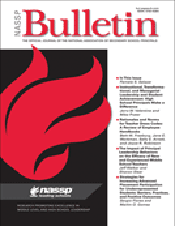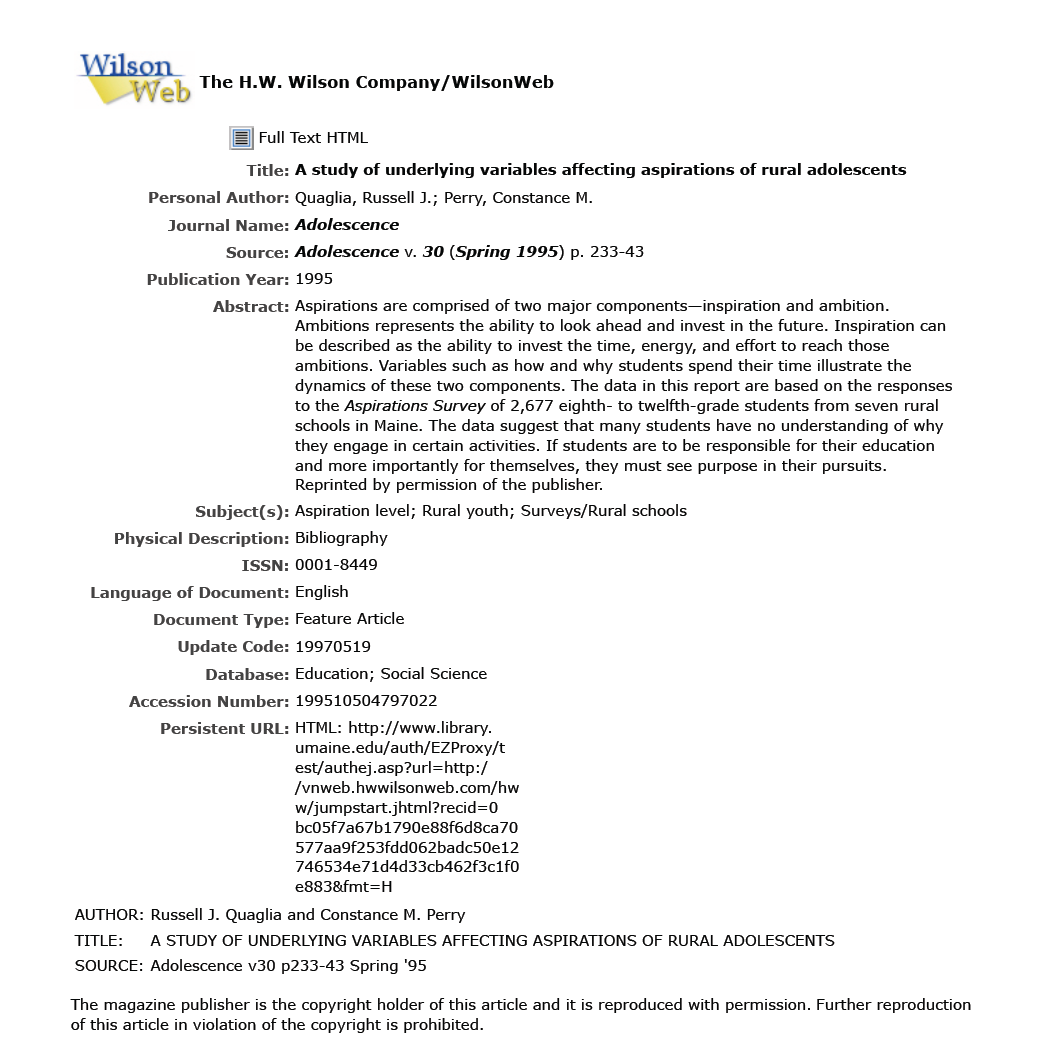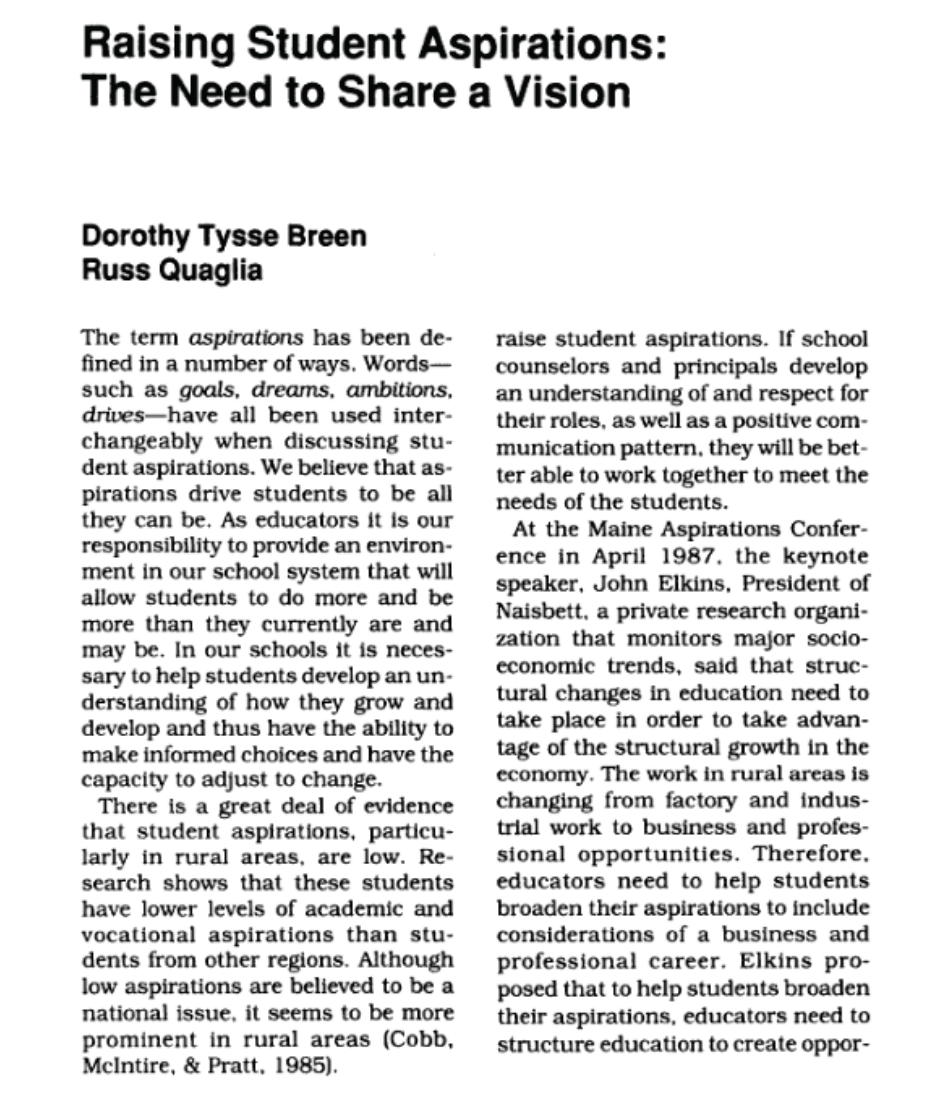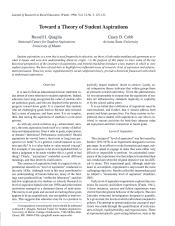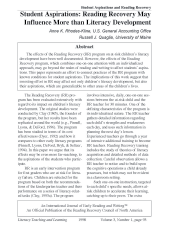Staff Publications
Since 1989, the Quaglia Institute staff has published widely on the topics of student voice and aspirations and voice. Many of the articles listed here are available for download, and books are available through Corwin and ASCD. We have also been guests on numerous podcasts and interviews, a few of which have been included here.
Purpose: A Renewable Energy Fueling Educators: A Guide to Reigniting Passion and Purpose in Education In Teaching, Leading, and Learning
Teaching and leading were never meant to drain you — they were meant to fuel you.
In Purpose: A Renewable Energy Fueling Educators, Dr. Russ Quaglia and Dr. Kristine Fox offer an inspiring guide to rediscovering the “why” behind your work. Drawing on decades of research and real stories from classrooms and leadership teams, they reveal how purpose can be renewed — not lost — even in the most challenging times.
Student Voice: It’s Not Nice, It’s Necessary
If you have ever wondered what Student Voice is and isn't, this episode is for you! Explore how amplifying student voices fosters a positive learning atmosphere as you join Dr. Russ Quaglia and Dr. Lisa Lande in this episode from School Leaders Project. Drs. Russ and Lisa share insights on understanding why students speak up and the benefits of creating an environment where their opinions matter, and actionable practices like “Sit With Wisdom,” spotlighting the value of genuine interactions between teachers and students.
Dr. Russ Quaglia and Aspirations Podcast
Listen to the first episode of Aspirations Voice podcast from the Aspirations Academies Trust in England. Dr. Russ Quaglia explains how working with student voice and aspirations shaped his educational practice, and shares the importance of listening to, learning from, and leading with students and teachers.
Linking Aspirations, Emotional Intensity, and Focus with Wellbeing and Learning
By connecting voice, aspirations, and actions, we can inspire students to achieve their potential and contribute to the world around them. All of us need encouragement to voice our hopes and dreams and be supported to work hard towards those dreams. Published by ACEL AU.
Student Voice - The Critical Component of School Improvement
Written by Sue Bryen, Director of Learning Services (AU) at the Quaglia Institute for School Voice and Aspirations, and published by ACEL AU.
When students are invited to co-create the way forward, not only do school improvement efforts lead to meaningful change, but students learn how to use their voices to engage and succeed both in school and in life.
Do Students Really Have a Voice in Your School?
It is time we celebrate and learn from the schools that are truly practising student voice. Written by Drs. Quaglia and Fox, this article shares how schools can involve students as collaborative partners in learning, so that the notion of student voice is no longer looked upon as something special, but rather as an integral part of what defines a school.
Dream Bigger
This piece, written by Dr. Quaglia, challenges us all to Dream Bigger as we look towards the future.
Why Student Voice Matters More Now Than Ever
ASCD Learn Teach Lead Radio
Dr. Quaglia believes that we often view student voice as important but not a priority. Join him to explore why student voice may be more important than ever in these trying times.
The Power of Voice in Schools
For nearly four decades, Russ Quaglia has been laying the groundwork to inform, reform, and transform schools through student voice.
This inspirational book deftly synthesizes the thoughts and feelings of hundreds of thousands of stakeholders and offers a vision for schools where everyone's voice matters. The authors posit that students, teachers, administrators, and parents must work and learn together in ways that promote deep understanding and creativity.
Fostering Student Voice
When students have a voice, they are motivated to learn, exhibit greater self-worth, are meaningfully engaged in learning, and have a greater sense of purpose. This handy guide, based on years of research and work in schools, describes a four-step process for fostering student voice. Written by Drs. Quaglia and Fox, this guide will help teachers promote authentic student voice in the classroom and engage students in building identity, agency, and purpose.
Not Finding Their Voice
Students feeling they have a voice is a key indicator of emotional safety. Surveys show there's not enough of either in schools.
What would happen if all students felt valued and had a powerful voice in school? Might it create a safer environment? Our research at the Quaglia Institute for School Voice and Aspirations suggests that it would. When students have a "voice" in school, they feel more known, valued, and cared about and have a stronger sense of self-worth.
Student Voice: A Way of Being
Lead article, written by Dr. Quaglia and Dr. Fox, published in the Australian Educational Leader, Vol 40 Term 1 2018.
Pose Reflective Questions: Teachers and Students Must Unite to Build a 'New Normal'
As we prepare to welcome students back to brick and mortar classrooms, we can pool our most creative thinking, learn together, and move forward with a celebratory and strong spirit. This article is free to registered users of Education HQ, and registration is free.
Practical Tips to Make Student Voice the Cornerstone of Your Online Classes
Educators who are committed to amplifying student voice know that voice thrives in a classroom built upon trust, respect, and a sense of community.
This article is free to registered users of Education HQ, and registration is free.
Teachers, your voice is your most powerful tool for success in online learning
In the midst of the COVID-19 pandemic it is important to recognise which aspects of teaching and learning you can control and which you cannot. This article is free to registered users of Education HQ, and registration is free.
Students aren't victims: it's critical we harness their voice to drive online learning
Rather than "fix" things for students, we need to engage them in decision making. We need to learn with them what will work for them as they navigate through this transition to online learning. This article is free to registered users of Education HQ, and registration is free.
10 steps to incorporating student voice into remote learning
While everything feels different these days, student voice remains as important as ever. This article shares ten pieces of advice on how to infuse student voice into online learning, give students some control during this chaotic and seemingly uncontrollable time, and keep students meaningfully engaged.
COVID-19: An opportunity to listen, learn, and lead with our children
As educators and families consider new approaches to learning during prolonged school closures, an intentional effort must be made to listen to our children, learn from what they have to say, and lead together to help heal the world.
Five Reasons to Nurture Student Voice As Early As Possible
Listen as Cali Quaglia and Dr. Russell Quaglia, authors of Cay and Adlee Find Their Voice, make a strong case for helping students find and use their voice as early as possible.
Cay and Adlee Find Their Voice
The world is a noisy place. It's full of voices, but what are they all for? How are they different, and how do people use their voices to be heard?
Created by Dr. Russ Quaglia and his daughter Cali—along with award-winning illustrator Daniel Minter—Cay and Adlee Find Their Voice supports the Quaglia Institute's work around the importance of student voice. For ages 4-7.
Parent Voice: Being in Tune With Your Kids and Their School
Find your best voice to inspire your child to reach their aspirations: With no single or right formula to teach, reassure, or help a child, no precise age gauge for first experiences, and blurry lines between clear, obvious, and gut decisions, how can a parent know what is best or right in the course of their child's education?
Engagement by Design
Engaging Students for Success Through Purposeful Design: Every teacher wants engaged students. No student wants to be bored. So why isn't every classroom teeming with discussion and activity centered on the day's learning expectations?
The Power of Teacher Voice: How Cobb County Is Leading the Way
Cobb Country School District believes that they must care about the engagement of teachers, listen when teachers suggest what they need and what their students need, and provide them with opportunities to make decisions about their own professional learning. This included creating a Teacher Leader Academy, a thoughtfully designed “Deeper Learning” summer institute and quarterly meetings throughout the school year provide teachers with hands-on, engaging training on developing their voices so they can listen, learn, and lead from their position in the classroom.
Young Voice, Big Impact
Students want to be heard. They perceive asking questions as the primary avenue for being heard. Provide students with opportunities beyond asking questions to express their ideas, opinions, and concerns.
Aspire High
The world's best high school may be a dream, but it's not out of reach. It's a model drawn from research, observations, focus groups, and interviews, and each aspect of its success exists in a real school today.
Teacher Voice
Help teachers find their voice and positively influence meaningful school change with this inspiring guide from student aspirations pioneers Russell Quaglia and Lisa Lande. You'll discover practical action steps, teacher interviews, in-depth research, and more. Improve retention, innovation, professional development, and student achievement with this breakthrough guide!
Cut Through the Noise & Embrace Parent Voice
Parents and families provide unique perspectives about their children. They experience their child's fears, joys, excitements and disappointments on a daily and sometimes even hourly basis. As educators who advocate for School Voice work, we should welcome these insights into the life of our schools.
Principal Voice
Good principals know that empowering student voices is essential. But what about their own voice? If principal voice is not articulate, trustworthy and strong, how can the school achieve progress?
Make An Impact
Hone your principal voice by listening, learning, and leading, as well as speaking for yourself. Click here to download the PDF.
A Lesson in Listening
Published in RSA Journal Issue 1 2016.
Dr. Russ Quaglia and Dr. Kristine Fox discuss why empowering students to find - and use - their voice is the first step on the road to creativity in education.
Please note you will need to download the PDF version of the journal - this article is on page 46.
Teacher Voice: Problem or Potential?
Take steps to enrich the voice of your vocal and not-so-vocal teachers. Click here to download the PDF article.
Turn Up the Volume
Russell Quaglia and Michael Corso share the three steps to turn up the volume on student voice. Are you ready to listen to, learn from and lead with your students? Click here to download the PDF article.
Student Voice: Turn Up The Volume K-8 Activity Book
Help your students reach their fullest potential. Create unique learning experiences adaptable to their needs and aspirations. Based on hundreds of teacher and student interviews, the authors implement the 3 Guiding Principles and 8 Behaviors and Conditions that profoundly affect student success in grades K-8.
Order Student Voice: Turn Up the Volume K-8 Activity Book
Student Voice: Turn Up The Volume 6-12 Activity Book
A companion piece to the K-8 guide, this extraordinary activity book by internationally acclaimed experts Dr. Russell Quaglia, Dr. Michael Corso and Julie Hellerstein implements the 3 Guiding Principles and 8 Behaviors and Conditions that will help your students soar to success!
Order Student Voice: Turn Up The Volume 6-12 Activity Book
Teacher Voice: Myth? Or Long Overdue?
Education Week: Finding Common Ground.
A guest post co-authored by Lisa Lande and Russell Quaglia from the Teacher Voice and Aspiration International Center. "Now is the time to amplify teacher voice as a valuable resource in school change efforts".
The Word on Voice
Russell Quaglia explains why it's time to start listening to students and teachers. Click here to download the PDF article.
Student Voice: Pump It Up!
Student Voice: The Instrument of Change
Students should be central to any educational reform agenda. Student Voice: The Instrument of Change shows how you can achieve this with the Listen, Learn, and Lead approach: ask young people their thoughts and truly listen, learn from what students say, and utilize what you learn to be an effective leader of change.
Order Student Voice: The Instrument of Change
Student Voice and Resilience in Learning
Although research has a lot to say about how to foster academic resilience, encouraging student voice - which an abundance of research shows to have a positive effect on school success - has been largely overlooked (Mager & Nowak, 2012; McNulty & Quaglia, 2007; Mitra, 2004). This ASCD Express article looks at how student voice and academic success are inextricably linked - even among students from challenged backgrounds.
American School Board Journal Q&A with Russell Quaglia, expert on student engagement
Q&A with QISA's President and Founder, Dr. Russell Quaglia, featured in the American School Board Journal. Click here to download the PDF article.
Where Student, Teacher, and Content Meet: Student Engagement in the Secondary School Classroom
Student engagement is a much discussed topic in schools today. Engaged students are more likely to be academically motivated and to enjoy success in their classes. Published in the American Secondary Education Journal (Volume 41, Number 3, Summer 2013), this article focuses specifically on how engagement works in the classroom as a function of the interactions between students, teachers, and the class content. Click the image to the left to download the article.
Living the Mission
This look at successful schools whose mission statements drive all decisions was featured in the October 2012 American School Board Journal. Includes case studies and the top three steps schools can take to start living out their own mission statements. Click the image to the left to download the article.
The Active Voice: The Role of Student Voice in Promoting Students' Engagement in School
This is a commentary draft of the paper presented by Dr. Matthew J. Bundick at the American Educational Research Association (AERA) 2012 Conference in Vancouver, BC, Canada. Click the image to the left to download the article.
Student Voice
This look at getting elementary school students involved in their learning, published as a Web Exclusive in NAESP's January/February 2012 Principal, includes analysis of My Voice student survey data with subsequent actions educators can take to encourage student voice in their schools. Click the image to the left to download the article.
Focused on Student Success: A Five-Year Research Study on Models, Networks, and Policies to Support and Sustain Rigor and Relevance for ALL Students
The Successful Practices Network, the International Center for Leadership in Education, and the Council of Chief State School Officers, with support from the Bill and Melinda Gates Foundation, embarked on a five-year high school initiative to identify, analyze, enrich, and disseminate the nation's most successful schoolwide practices and policies as a way to achieve a rigorous and relevant curriculum for all students, with a particular focus on classroom instruction and effective learning. The Quaglia Institute for Student Aspirations partnered with this group in 2009-10 to provide research support for the initiative, as presented in this report. Click the image to the left to download the article.
Got Opportunity?
This article, published in ASCD's Educational Leadership, examines how students' views about their opportunities in school and about student-teacher relationships correlate with students' levels of motivation, effort, and achievement. After analyzing survey responses, the authors conclude that the "opportunity gap" some students face has three key elements: the expectations gap, the relationships gap, and the participation gap.
Rigor, Relevance, and Relationships
How can students meet high academic standards if they don't believe in their ability to do so? This article, featured in AASA's The School Administrator, promotes an instructional framework for unlocking the door to engage high school students to learn at appropriate levels.
Eight Ways to Motivate Your Staff
Published in NAESP's Principal (January/February 2005), this article describes eight conditions that principals can support to motivate faculty and staff to achieve their fullest potential. Click the image to the left to download the article.
Sam's Adventures in School
This beautifully illustrated book helps adults talk with children about the 8 Conditions. Each story focuses on one of the Conditions, and is followed by questions and prompts to help adults and young people talk about their own experiences.
Creating a Classroom Culture that Inspires Student Learning
This article, published in The Teaching Professor, provides an overview of how the 8 Conditions can inspire student learning in the classroom. Click the image to the left to download the article.
Student Aspirations: Eight Conditions That Make a Difference
This inspirational book stresses the importance of developing student aspirations - the ability to identify and set goals for the future, while being inspired in the present to work toward those goals. Based on more than 20 years of research, the book identifies eight conditions as being necessary to foster student aspirations - Belonging, Heroes, Sense of Accomplishment, Fun and Excitement, Curiosity and Creativity, Spirit of Adventure, Leadership and Responsibility, and Confidence to Take Action.
Raising Student Aspirations in the Classroom: Classroom Activities for Grades K-5
This book provides K-5 teachers with 72 classroom activities designed to empower and motivate their students' hopes and dreams. The activities include reading and writing, group discussions, games, stories, role plays, music, art, and more. The authors' creative and engaging approach is based on solid research and is shaped by the 8 Conditions that Make a Difference.
Raising Student Aspirations in the Classroom: Classroom Activities for Grades 6-8
This book provides 6-8 teachers with 72 classroom activities designed to empower and motivate their students' hopes and dreams. The activities include reading and writing, group discussions, games, stories, role plays, music, art, and more. The authors' creative and engaging approach is based on solid research and is shaped by the 8 Conditions that Make a Difference.
Raising Student Aspirations in the Classroom: Classroom Activities for Grades 9-12
This book provides 9-12 teachers with 72 classroom activities designed to empower and motivate their students' hopes and dreams. The activities include reading and writing, group discussions, games, stories, role plays, music, art, and more. The authors' creative and engaging approach is based on solid research and is shaped by the 8 Conditions that Make a Difference.
Changing lives through the principalship: A reflective guide for school leaders
This book uses the 8 Conditions as a framework for improving school leadership. Administrators are presented with challenges, reflections, and action steps for effectively using the 8 Conditions as a leadership model.
The Student Aspirations Survey: Assessing Student Effort and Goals
Published in Educational and Psychological Measurement, this article presents theory and research on intellectual achievement that suggests a seldom-examined factor, student aspirations, plays an integral role in students' educational accomplishments.
Making an Impact on Student Aspirations: A Positive Approach to School Violence
Published in the NASSP Bulletin, this article shares an approach to make schools safer places for students using the 8 Conditions.
A Study of Underlying Variables Affecting Aspirations of Rural Adolescents
This paper, published in Adolescence (Vol. 30, No. 117), examines aspirations in a different light by analyzing variables which can be directly influenced by the student, family, and/or school personnel. Aspirations are comprised of two major components - inspiration and ambitions. Click the image to the left to download the article.
Raising Student Aspirations- The Need to Share a Vision Quaglia & Breen 1991
This article, published in School Counselor (Vol. 38, No. 3) presents selected data comparing aspirations of rural youths with those of suburban and urban youths; discusses the roles of the school counselor and of the principal to examine how these roles relate to the fostering of student aspirations; and offers workable solutions for the principal and school counselor to work collaboratively in the school to enhance student aspiration. Click the image to the left to download the article.
Toward a Theory of Student Aspirations
Student aspirations is a term that is used frequently in education, yet there is little understanding and agreement as to what it means and even less understanding about its origin. The purpose of this paper, published in the Journal of Research in Rural Education (Vol. 12, No. 3) is to trace some of the key historical perspectives of the construct of aspirations, and from this backdrop introduce a new manner in which to view student aspirations. Click the image to the left to download the article.
Student Aspirations: Reading Recovery May Influence More than Literacy Development
This paper, published in the Reading Recovery Council of North America's Literacy Teaching and Learning (Volume 3, Number 1), represents an effort to connect practices of the Reading Recovery (RR) program with known conditions for student aspirations. The implications of this work suggest that investing effort in RR may affect not only children's literacy development, but also their aspirations, which are generalizable to other areas of the children's lives. Click the image to the left to download the article.

